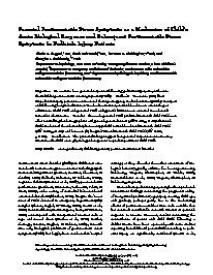Parental Posttraumatic Stress Symptoms as a Moderator of Child’s Acute Biological Response and Subsequent Posttraumatic Stress Symptoms in Pediatric Injury Patients
Objective: To examine how parental responses following pediatric injury may influence their child’s posttraumatic stress symptoms (PTSS).
Methods: Heart rate (HR) from 82 pediatric injury patients was measured during emergency medical services (EMSs) transport and following hospital admission. Twelve-hour urinary cortisol levels were assessed upon admission. Child PTSS and parental PTSS and general distress were assessed 6 weeks and 6 months after trauma.
Results: Six-week parental PTSS predicted 6-month child PTSS even after controlling for demographics and general parent distress (ΔR2 = .08, p = .03). Parental PTSS moderated the relationship between (a) child cortisol levels and 6-month child PTSS (ΔR2 = .08, p = .03) and between (b) hospital HR and 6-month child PTSS (ΔR2 = .09, p = .03).
Geachte bezoeker,
De informatie die u nu opvraagt, kan door psychotraumanet niet aan u worden getoond. Dit kan verschillende redenen hebben,
waarvan (bescherming van het) auteursrecht de meeste voorkomende is. Wanneer het mogelijk is om u door te verwijzen naar de bron
van deze informatie, dan ziet u hier onder een link naar die plek.
Als er geen link staat, kunt u contact opnemen met de bibliotheek,
die u verder op weg kan helpen.
Met vriendelijke groet,
Het psychotraumanet-team.
In: Journal of Pediatric Psychology ISSN: 0146-8693 | 32 | 3 | 309-318
https://academic.oup.com/jpepsy/article/32/3/309/2951612


